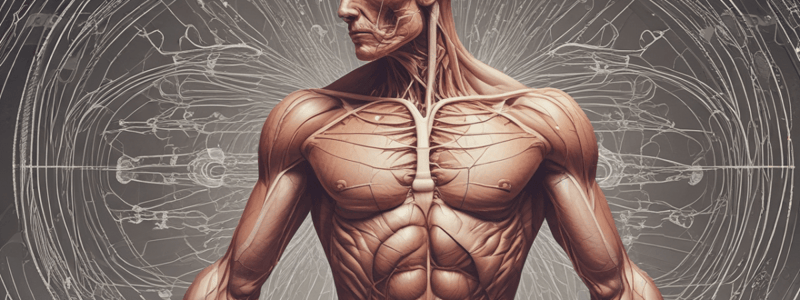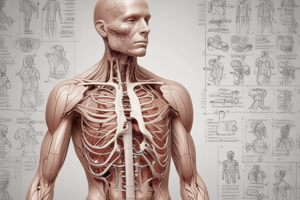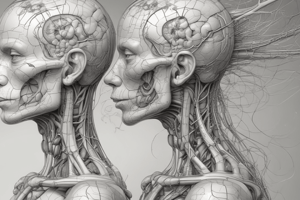Podcast
Questions and Answers
What is the primary function of the kidneys?
What is the primary function of the kidneys?
- Digest food by mixing it with stomach acid and enzymes
- Filter blood to remove waste products and excess substances (correct)
- Regulate body temperature
- Produce digestive enzymes and hormones
What is the main function of the lungs?
What is the main function of the lungs?
- Facilitate the exchange of oxygen and carbon dioxide (correct)
- Absorb nutrients from digested food
- Produce bile for digestion
- Pump blood throughout the body
What is the function of the small intestine?
What is the function of the small intestine?
- Produce digestive enzymes and hormones
- Absorb nutrients from digested food into the bloodstream (correct)
- Form and store feces
- Filter blood to remove waste products and excess substances
What is the role of the skin?
What is the role of the skin?
What is the function of the liver?
What is the function of the liver?
What is the primary function of the stomach?
What is the primary function of the stomach?
Flashcards are hidden until you start studying
Study Notes
Nervous System
- Controls all bodily functions, interprets and processes sensory information, and enables thinking, learning, and emotions.
Circulatory System
- Pumps blood throughout the body, delivering oxygen and nutrients to cells and removing waste products.
Respiratory System
- Facilitates the exchange of oxygen and carbon dioxide during breathing, allowing oxygen to enter the bloodstream and carbon dioxide to be expelled.
Digestive System
Liver
- Performs various functions including detoxification of blood, synthesis of proteins, production of bile for digestion, and storage of nutrients.
Stomach
- Digests food by mixing it with stomach acid and enzymes, breaking it down into smaller molecules for absorption.
Pancreas
- Produces digestive enzymes and hormones such as insulin and glucagon, which regulate blood sugar levels.
Small Intestine
- Absorbs nutrients from digested food into the bloodstream, including carbohydrates, proteins, fats, vitamins, and minerals.
Large Intestine (Colon)
- Absorbs water and electrolytes from undigested food, forms and stores feces, and facilitates the elimination of waste from the body.
Excretory System
Kidneys
- Filter blood to remove waste products and excess substances, regulate fluid and electrolyte balance, and produce urine.
Integumentary System
Skin
- Acts as a barrier to protect the body from external threats, regulates body temperature, and contains sensory receptors for touch, pressure, temperature, and pain.
Studying That Suits You
Use AI to generate personalized quizzes and flashcards to suit your learning preferences.




